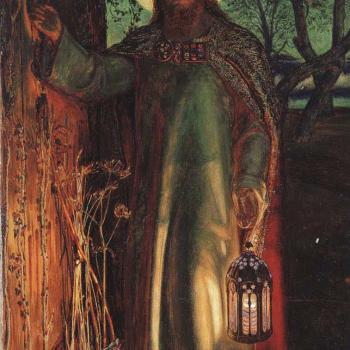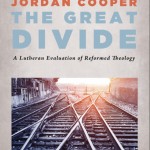Lutheran theologians contend that the principles of salvation sola gratia (by grace alone), and universalis gratia (universal grace) stand together within the Biblical text. God’s salvation and election are freely granted; God’s grace is given without condition. Yet, God’s grace is not limited to a particular group. God’s saving will embraces all of his creation. We thus affirm the Calvinistic belief monergism, while simultaneously affirming the Arminian commitment to universal grace. Calvinism has embraced sola gratia at the expense of universalis gratia, while Arminianism has embraced universalis gratia at the expense of sola gratia.
In my book The Great Divide, I deal with a number of texts surrounding the notion of universal grace in relation to the Reformed belief in limited atonement, or particular redemption. I address 1 Timothy 2:4, 1 John 2:2, and 1 Peter 2:1. Due to the nature and scope of this work, I was not able to deal with every text about universal grace, and popular Calvinistic responses to such texts. On such verse is 2 Peter 3:9, which has commonly been used by Lutheran theologians in opposition to Reformed particularism. Peter writes:
The Lord is not slack concerning His promise, as some count slackness, but is longsuffering toward us, not willing that any should perish but that all should come to repentance. (NKJV)
This text explains that it is God’s sincere will that none should perish. Thus, God has a saving will which encapsulates all of humanity. It is his desire that all reach repentance.
There are two primary ways in which this text is dealt with by Reformed theologians: first, there are some who acknowledge the universalistic nature of this verse. In doing so, they posit that there are two distinct wills within God: a universal will, and a saving will. There is some sense in which God does not delight in the death of the reprobate, even while God simultaneously decrees their damnation. This is the perspective taken by Thomas Schreiner in his essay “‘Problematic Texts’ for Definite Atonement in the Pastoral and General Epistles.” [1] This approach is exegetically sensible, in that the text is taken at face value. There are however, three primary problems with such an approach:
1. This posits a contradiction within God, and particularly in relationship to his saving will. Such a contention is inconsistent with the character and nature of God as explained elsewhere in Scripture.
2. There simply is no Biblical basis for affirming that God has these two different saving wills. Its an imposition upon the text, created simply to make sense of certain verses within the Calvinistic theological system.
3. For this to be true, there must exist some kind of saving will of God apart from Christ. Within the covenant of redemption, God covenanted with the Son to send him to save a particular people from sin. Since Christ’s work was never intended for these particular people, there must be some kind of universal will which exists outside of his saving work. This is the primary theological issue with the “two wills” approach.
The second manner in which this text is dealt with is by arguing that the “us” of which Peter is speaking are the elect. Thus, Peter is not speaking universally. It is simply that God does not desire any of his elect to perish. John Gill explains:
nor is it true of all men, that God is not willing that any of them should perish, and that everyone of them should come to repentance, since many of them do perish in their sins, and do not come to repentance, which would not be the case, if his determining will was otherwise; besides, a society or company of men are designed, to which the apostle himself belonged, and of which he was a part; and who are described, in his epistles, as the elect of God, called out of darkness, into marvellous light, and having obtained like precious faith with the apostles; and must be understood either of God’s elect among the Jews, for Peter was a Jew, and they were Jews he wrote to; and then the sense is, that the delay of Christ’s coming is not owing to any slackness in him, but to his longsuffering to his elect among the Jews, being unwilling that any of that number among them should perish, but that all of them repent of their sins, and believe in him. [2]
This approach has been popularized by R.C. Sproul in his book Chosen by God, wherein he points out that this particular book is written to the elect of God, not to all men generally. Thus the “us,” in the preceding section, to whom God’s patience belongs, are simply the elect. Thus this text is said not to support a universal saving will, but instead is a proof-text for election and particular grace.
One of the statements commonly made regarding 1 Peter is that this book is written specifically to the elect. Yet, the proof for this does not come from the text itself, but from Peter’s previous epistle. [3] It is stated that because 1 Peter is written to the “elect according to the foreknowledge of God” (1 Pet. 1:2), 2 Peter also assumes such an audience. There are three primary points I want to make in response to this claim. First, just because Peter writes once to a specific audience, that does not mean that all of his subsequent letters are written to the same exact audience. Second, Peter is not even addressing his first epistle to “all the elect who ever live,” but to those believing first century saints in Pontus, Galatia, Cappadocia, Asia, and Bithynia (1 Pet. 1:1). The third point is simply that the readers of Peter’s second epistle should read his statements in light of the audience actually addressed in that letter.
In 2 Peter, the apostle identifies the audience to whom he is writing as “those who have obtained like precious faith with us” (2 Pet. 1:1). This epistle is not addressed to all those who are elect according to God’s decree. Instead, Peter writes to those saints who are currently in possession of the faith. This is an essential point to understand as one examines 3:9. In this text, Peter explains God’s patience, arguing that he is not willing for any to perish, but for all to repent. Reformed intepreters note that Peter mentions God’s patience toward “us,” prior to his statement that God wills for all to be saved. Contextually, therefore, the same “us” that God is patient toward is the “us” that God wills to be saved. What needs to be identified is the referent meant by “us” in this text.
There are three possible identifications of the “us” in this epistle: first, Peter might be referencing he entire human race, noting that God desires every person to come to repentance. Second, Peter could be speaking specifically to the elect, who God will inevitably save. Third, Peter might be speaking only to the particular group to whom he is writing. For many Calvinistic interpreters, the second and third options are synonymous, because Peter is writing specifically to “the elect.” However, as was noted, there is no reference to election in this entire book. It would then be rather odd for Peter to simply assume that his audience believed this book to be for all of those who God has decreed unto salvation without any mention of that fact. The second option, then, is rather unlikely unless it can be substantiated that he means “those who have obtained faith” to be understood as the elect. This identification is, however, unsubstantiated. Note that Peter is speaking specifically about those who have obtained the faith. In other words, Peter is writing to those who are already Christians. Yes, those who are Christians have become so by God’s decree, but there is not an exact identification between all those who were presently saved and all who would ever be saved.
If one desires to follow the pronouns throughout 2 Peter with the contention that the addressees are the same group identified with the “us” in 2 Peter 3:9, there is a substantial problem. The point of 2 Peter 3:9 is that God is presently being patient toward the “us” with a desire that those within this group will come to repentance. If, however, this group is identical with those to whom the letter is addressed, a contradiction appears. The letter is written to those who are already in the faith, and 2 Peter 3:9 is addressing those who are not in the faith. If this is the case, Peter is essentially saying: “God is patient toward those who have repented…willing that all of those who have repented shall come to repentance.” It is abundantly clear that Peter is not identifying the “us” with those to whom his epistle is addressed. It is instead a much broader group.
In context, this statement appears within a discussion regarding eschatology. The reason for God’s delay in sending Christ is that he wills the salvation of all and desires repentance. There is no exclusivism in this text regarding God’s saving will. Unless someone can substantiate that this text is a reference to the elect in particular, it must be read in a straightforward manner.
[1] From Heaven He Came and Sought Her, 375-397.
[2] http://www.biblestudytools.com/commentaries/gills-exposition-of-the-bible/2-peter-3-9.html
[3] This explanation can be found in this article by John Samson: http://www.reformationtheology.com/2005/10/understanding_2_peter_39_by_pa.php












